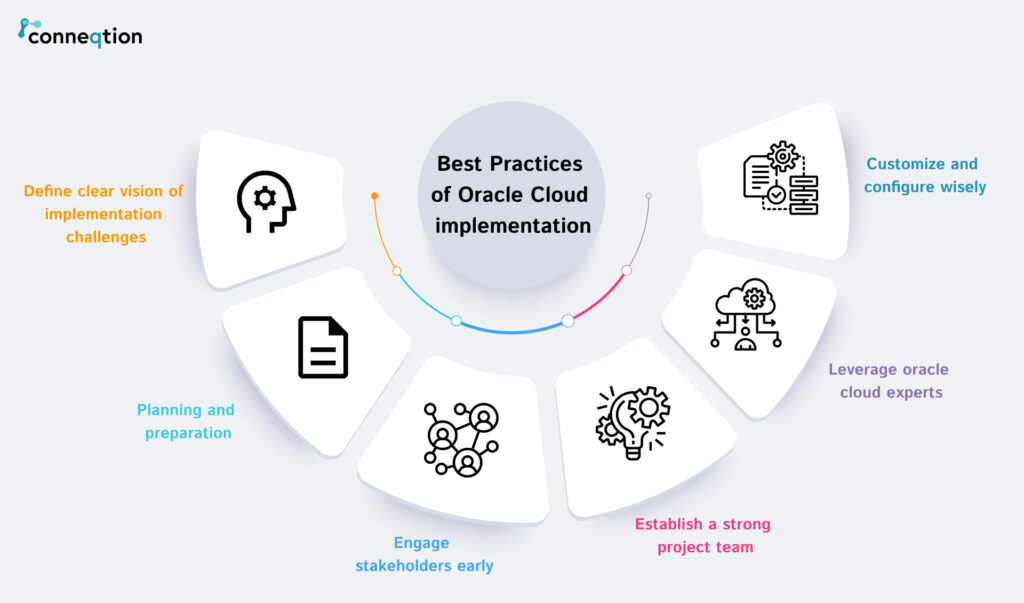According to a recent survey, 60% of organizations that have implemented Oracle Cloud have experienced challenges during the process. In this article, you will get to know how to overcome the top Oracle Cloud challenges and its best practices for a smooth cloud implementation process. Let’s get started.
Why implement Oracle Cloud?
Implementing Oracle Cloud offers organizations numerous benefits such as it provides scalable and flexible infrastructure, enabling businesses to adapt to changing demands and optimize resource allocation, it has robust security measures and reliable services, Oracle Cloud ensures data protection, regulatory compliance, and high availability. Its comprehensive suite of cloud services, encompassing IaaS, PaaS, and SaaS offerings, empowers organizations to develop, deploy, and manage applications efficiently.
Top Oracle Cloud Implementation Challenges faced by Organizations
#1 Data Migration
The process of migrating data from legacy systems or on-premises databases to Oracle Cloud can be complex. Data formats, data quality issues, and ensuring data integrity during the migration process can pose significant challenges.
Solution
Plan and execute a comprehensive data migration strategy that includes data profiling, cleansing, and validation.
#2 Customization and Configuration
Organisations often need to customize Oracle Cloud applications to align with their specific business processes and requirements. Balancing the need for customization while considering future upgrades and compatibility can be challenging. Balancing the need for customization while considering future upgrades and compatibility can be challenging.
Solution
Prioritize configuration over customization whenever possible to ensure compatibility with future upgrades. Leverage Oracle Cloud’s configuration options and extensibility frameworks to meet specific business requirements.
#3 Integration Complexity
The process of integrating Oracle Cloud with the organization’s existing systems, applications, and databases can be intricate. It involves addressing challenges such as maintaining seamless data flow, ensuring compatibility, and upholding data integrity across interconnected systems.
Solution
Leverage OIC to simplify integration between Oracle Cloud applications and on-premises systems and utilize pre-built adapters, connectors, and integration patterns.
Recommended Reading: How to Design a Callback Integration in OIC (Oracle Integration Cloud)
#4 Resource Allocation & Management Change
The implementation of Oracle Cloud entails substantial organizational transformation, encompassing modifications in processes, roles, and responsibilities, as well as the training of employees on new systems.
Solution
Build a complete plan that includes communication, training, and stakeholder engagement. Clearly communicate the benefits of Oracle Cloud adoption to gain buy-in from employees. Provide training and support resources to ensure a smooth transition.
#5 Cost Management
Typically, cloud services function on a pay-as-you-go model, wherein expenses correspond to the utilization of resources. Insufficient monitoring and optimization could result in surprising costs for businesses.
Solution
Monitor resource usage and optimize cloud services accordingly. Use employ cost management tool and analytics to track expenses. Leverage cost-effective pricing models such as reserved instances or spot instances.
3 best solutions for cloud migration challenges
By following these steps, organizations can mitigate common challenges and ensure a successful cloud implementation that aligns with their business objectives. It’s important to adapt these solutions based on the specific requirements and characteristics of each organization and cloud implementation project.
- Conduct a comprehensive analysis of business requirements and goals.
- Develop a well-defined implementation plan with clear milestones and objectives.
- Align cloud adoption strategy with the organization’s overall IT and business strategy.
Conclusion:
By adopting the above strategies and leveraging the resources and expertise available, organizations can overcome the top challenges of Oracle Cloud implementation. If you are considering Oracle cloud implementation for your organization then we have the experience and resources to help you leverage the benefits of Cloud implementation. Talk to our experts or write an email to [email protected].







